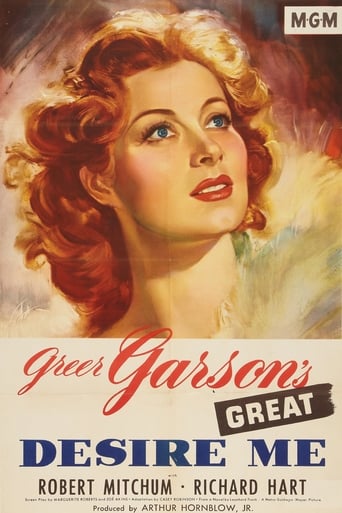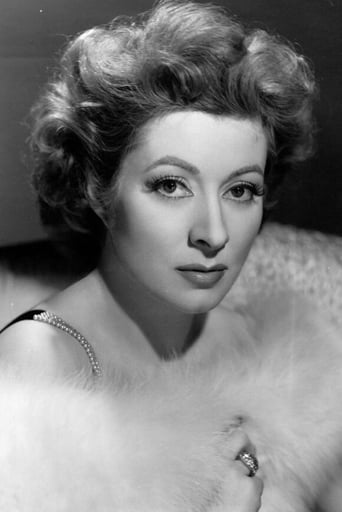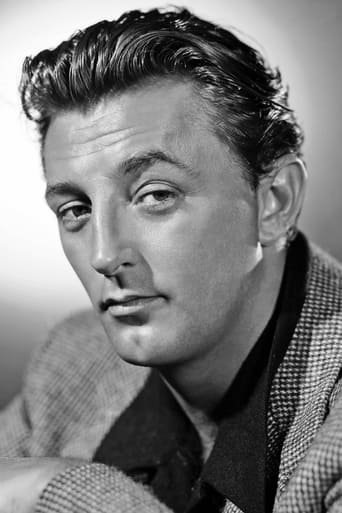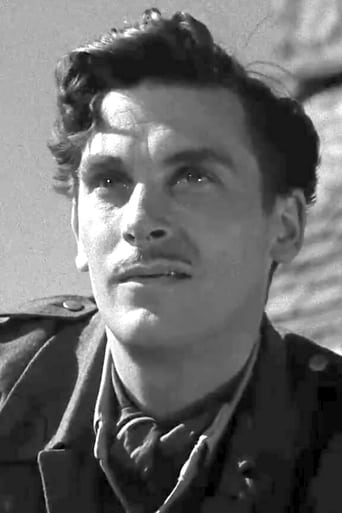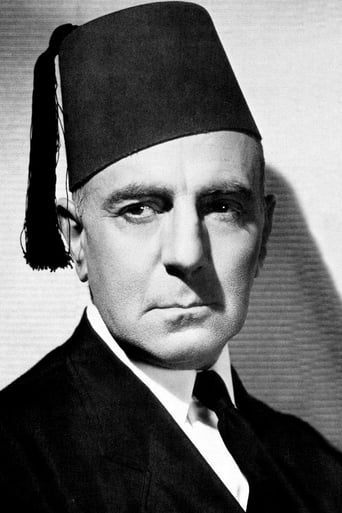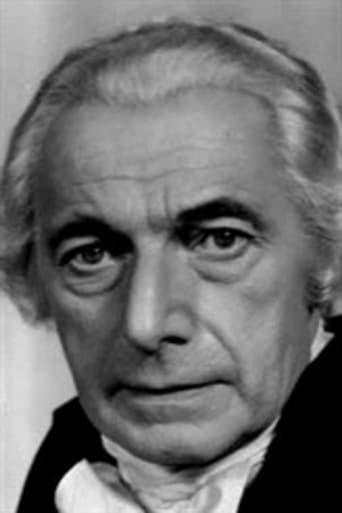Tayloriona
Although I seem to have had higher expectations than I thought, the movie is super entertaining.
Neive Bellamy
Excellent and certainly provocative... If nothing else, the film is a real conversation starter.
Portia Hilton
Blistering performances.
mark.waltz
As nobody desires this post war melodrama, especially the four uncredited directors, it landed with a loud thud near the top of MGM's most notorious disasters. By 1947, Greer Garson was the top leading lady at MGM of dramatic parts, more popular than glamour girl Lana Turner, much more well liked than the eccentric Katharine Hepburn, and the only actress in Hollywood outside of Bette Davis to seemingly be nominated for an Oscar almost every year. For the former Mrs. Miniver and Madame Curie, all it seems that she needed to do was get a script, memorize her part, and gold would strike. Unfortunately, she had flopped with "Adventure", and this, her first film after that, signaled that pairing her with anybody other than Walter Pidgeon, was probably not a good idea. Garson for this film got two leading men, Quickly rising up the ranks after years of minor parts and sudden success, brooding Robert Mitchum was cast as one of her two leading men here, and the forgotten Richard Hart was cast in the other major male role. What ends up happening here is a screenplay so messed up that upon the initial screening, I'm surprised that Louis B. himself didn't order the film shelved, simply to save face for the obvious fiasco that it is. Too moody and weird, this film has a structure that can only be described as an art house film that just didn't work. It's a post war story about the turmoil that supposed widow Garson goes through when her husband's pal (Hart) shows up to help Garson deal with her grief. Brief flashbacks to Garson marrying Mitchum follow to add confusing twists in the mix. The set direction and photography take over as the stars, but all that remains is an attractive 90 minute bore that seems to take itself too seriously as a piece of art.While there are a ton of extras in overstuffed crowd scene's, there's only the three actors credited in the opening that ends with producer credit rather than director credit. Several writers are also listed, as is the original novelist, so if the issue is the credited scriptwriter than the director, why did they not settle on at least one. The harsh roaring waves seem to be a metaphor for the crashdown of the film. Worse is the fact that you never really get to care about the lead males, and Garson overplays the nobility, making her saintlike, especially in the over the top musical moments in church where the choir is going way overboard to sound heavenly.
pamina716
I just finished viewing "Desire Me" (bad title, I admit), which I began with a bit of trepidation--so off-putting was its reputation as an MGM stinker--but I found myself drawn into its unique realm mainly by the compelling performances of G. Garson and R. Hart. Sadly, R. Mitchum, one of my favorite actors of all time, had little on screen time in which to create a character of depth. Perhaps the filmmakers didn't realize that they had (unintentionally?) created a fine piece of magic realism--the almost mythic setting in a remote and traditionally mystical part of France (the realm of Breton-Arthurian legend and the arcane spiritual 4th dimension of the Celts), land of fog and mists. There are the "singing pool" that Garson shows to Hart, the doppelganger figures of Hart and Mitchum, a deeply troubled Garson's brave navigation of the rough emotional waters between these two men, the superbly photographed climax in deep fog in which one could scarcely distinguish between Mitchum and Hart. The only jarring note was the badly read voice-over introducing a saccharine tone into the concluding moments of the film. I think this is a must-see for anyone claiming to be a knowledgeable fan of 1940s films.
Benoît A. Racine (benoit-3)
This film is an atrocious failure on many levels.It is emblematic of the loss of imagination and the draining of talent of the studio system in the late forties when confronted with the genius of European productions of the same time, especially Italian neo-realism.To begin with, the subject is extremely derivative. It is based on a German play that had already been made into a successful film in 1928 in Germany. This play was inspired, like a whole family of plays and films of the era, by a real event that took place in Italy in the 20's (the Bruneri-Canella case). This case also inspired the 1938 French film "Carrefour" (set in France and remade in Hollywood as "Crossroads"). This French film was later remade in England in 1940 as "Dead Man's Shoes". The same story inspired Pirandello's "As You Desire Me", set in Italy, in the late 20's, which became a Greta Garbo vehicle in the 30's, as well as the novel "The Wife of Martin Guerre" by American writer Janet Lewis (1941), a story set in France in the Middle Ages, which became the French film "The Return of Martin Guerre" (Daniel Vigne, 1982), which was of course remade as a Hollywood film starring Richard Gere, "Sommersby" (Jon Amiel, 1993) and set after the US Civil War. The same Italian story also inspired Edward Wool's 1935 play "Libel!" (filmed in 1959 in England), which has several similarities with the classic film "Random Harvest" (1942).As if the story was not tired enough, the big mistake was to transpose a German play about the aftermath of the First World War in a post-WWII French Brittany setting - filmed on the back lot - that just doesn't gel. The sets appear to be the ones used for the South of France in "Song of Bernadette" and the music by (the ordinarily trustworthy) Herbert Stothart is unconvincing in its attempt to convey any real sense of France or Brittany. Everything in the art direction is stilted and false. Its un-Frenchness is almost frightening. The viewer may get an occasional glimpse of O'Neil, Strindberg, Ibsen, Murnau and Rossellini, but never, never of a French fishing village.The subject and acting try very hard to reconnect the story to some sense of lustful reality while channelling something of the drama and realism of European serious cinema. But they fail. Imagining Robert Mitchum and Greer Garson as a French fisherman and his wife is simply an exercise quite beyond anyone's powers of self-deception.The end result is a cumbersome imitation of European simplicity with misfiring Hollywood production values, an embarrassingly stodgy melodrama that tries very hard to be a thoughtful little art film. It stinks and it sinks and it will forever remain as an example of one of the first signs of decadence of Hollywood's golden era.
Thomas W. Muther, Jr. (twm-2)
As has been noted elsewhere, during the filming of "Desire Me," Ms. Garson and Richard Hart were swept into the sea by a wave along the rocky coast of California. She nearly lost her life, and as it was, sustained severe injuries that required several surgeries. All this for a misfire of a film.If not for the luminous presence of Greer Garson, this movie wouldn't be worth anyone's time. Considering the cast and director (George Cukor, who removed his name from the credits before the film's release) it's a wonder how it turned out so relatively poor. One would think the script's weaknesses should have been readily apparent. {SPOILERS AHEAD} The outline of the plot is fine: Paul (Robert Mitchum) is imprisoned during WW-II in a German POW camp. He spends his time telling a fellow prisoner, Jean (Hart), details about his life with his wife, Marise (Garson). Jean, whose life has been less than idyllic, becomes absorbed in these tales, and soon begins to think of these stories as HIS stories. When he and Paul attempt escape, Paul is shot, but Jean succeeds. He goes to Paul's home he has come to know so well and tries to claim Marise, who has been faithfully waiting for Paul for several years, as his own--in spite of the fact that he knows (or at least strongly suspects) that Paul is actually still alive. That outline could have been turned into a fine film--but the details were its undoing. Crucial to the story is the devotion Marise and Paul have toward each other.Unfortunately, this supposed great love is spoken of, but never dramatized. We get one brief flashback of their marriage ceremony. We don't see their love grow, never observe its intensity. Yet we are supposed to be invested in their relationship. Without that investment the final reconciliation fails to move us, and so the ending falls flat. An even bigger failing is how the relationship between Marise and Jean plays out. He immediately begins to pressure her to form a relationship with him--this in spite of the fact that until he tells her that he saw Paul die, Marise still believed him to be alive. No matter how lonely she might have been in the years she awaited Paul's return, she obviously would need some months to grieve her loss. To have someone pushing her into a relationship the very day she hears the news would be off putting to say the least--terrifying and enraging being even more likely reactions. Instead, we are to believe that Marise would experience only some relatively vague misgivings, and within about a week is sufficiently recovered to consider marrying this man (so much for this supposed great love between Paul and Marise). For this bit of absurdity to work, all one would need do is, first, provide more background (lots more background) to the relationship between Marise and Paul. Second, make Jean more crafty. Instead of fairly pouncing on Marise, have him offer his friendship and support. Have their relationship grow over the course of MONTHS, not days. These two changes alone might have turned the movie into a classic--IF Ms. Garson and Mr. Mitchum could have developed some chemistry between them. As it stands, they had none. With only 4 minutes of screen time together, how much could they be expected to generate? It's too bad. They were two such great stars . . . it would have been interesting to see them together. Still, for all its considerable faults, I give the film a 5 out of 10 on the basis of the great Greer Garson's presence, some great cinematography and an interesting, if poorly realized, premise. All in all, it's too bad Ms. Garson didn't elect to work in some other, more rewarding--and less painful--project.
